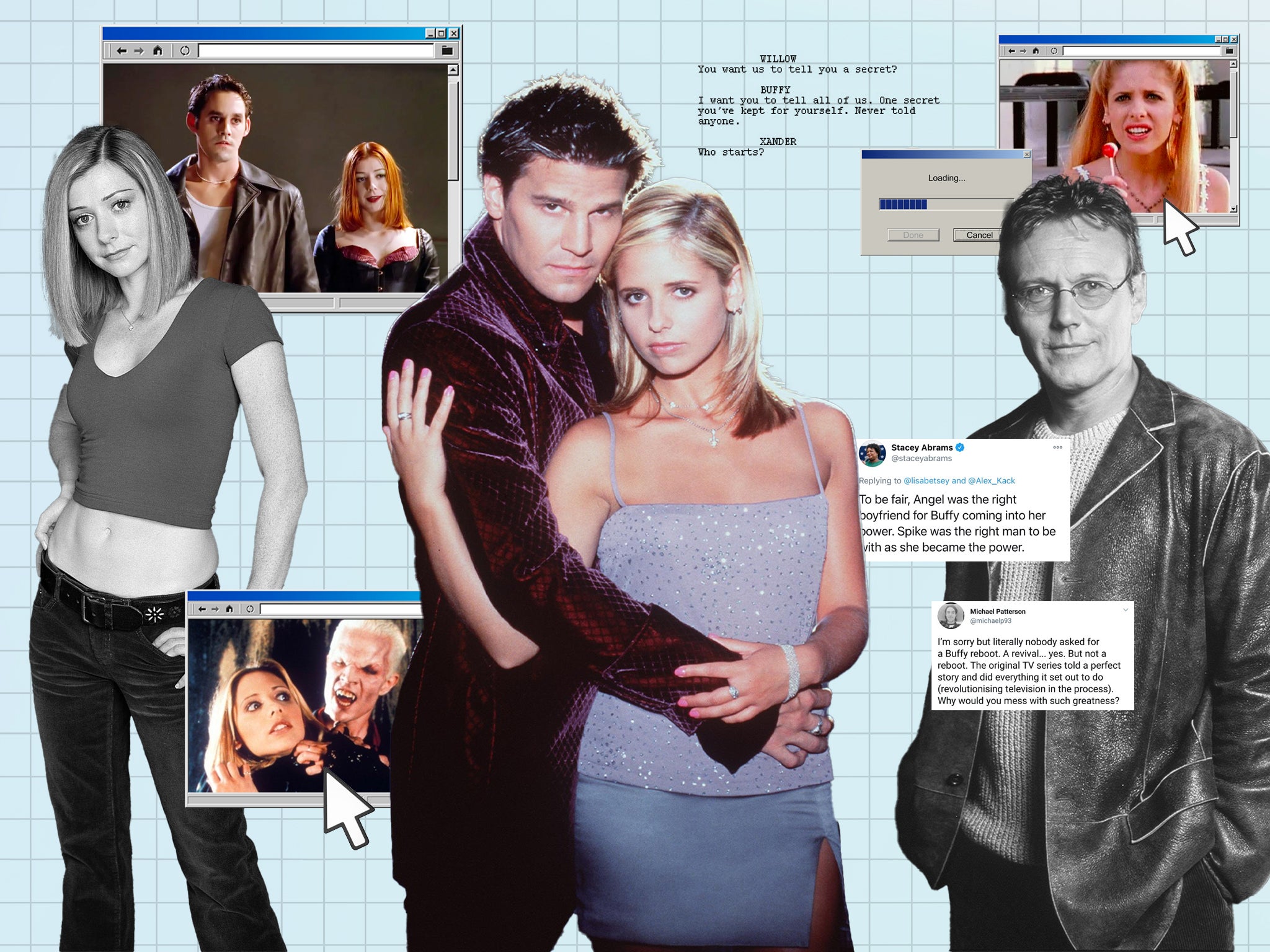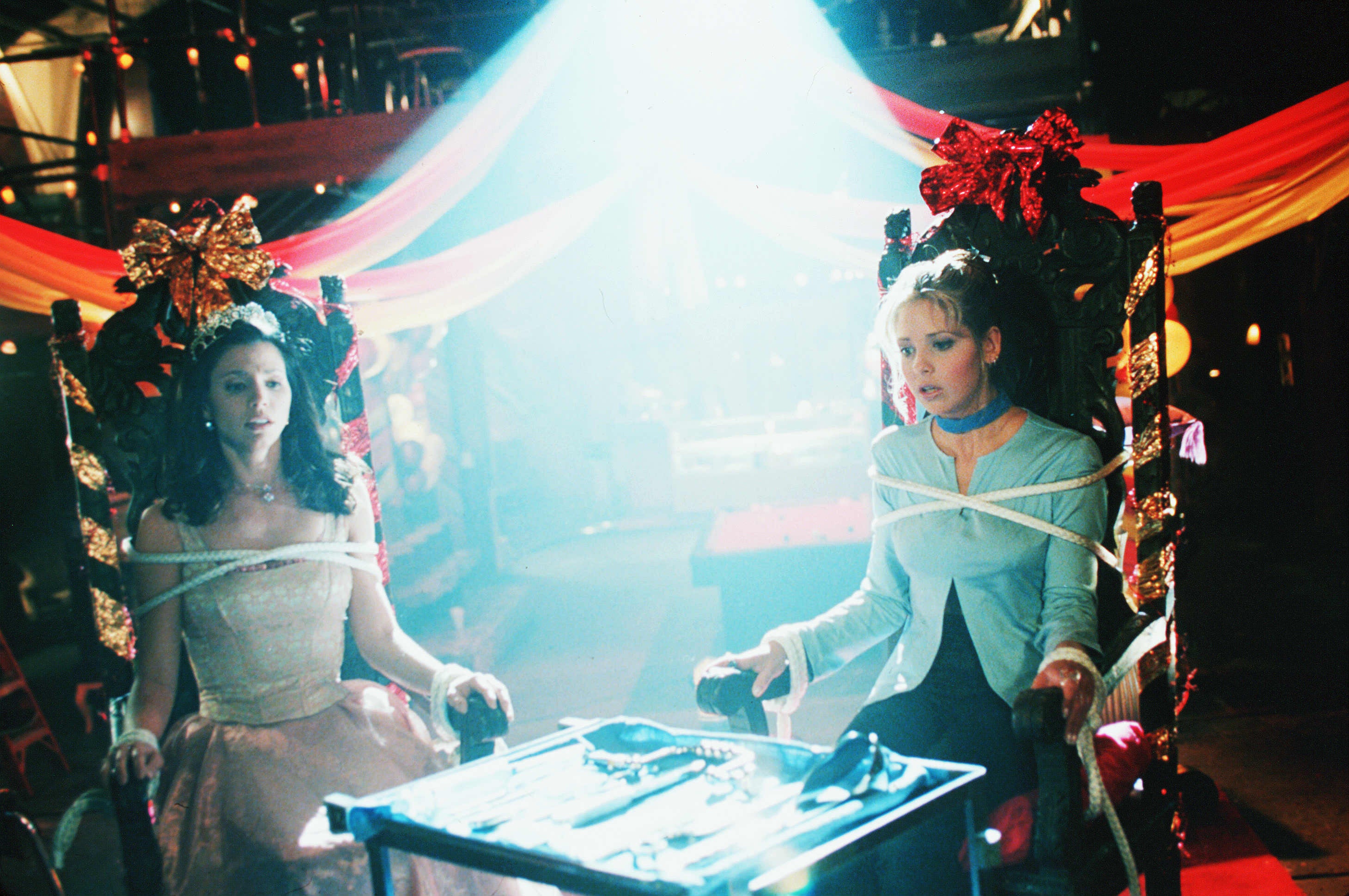The Independent's journalism is supported by our readers. When you purchase through links on our site, we may earn commission.
Buffy at 25: Joss Whedon may have tainted the show’s legacy – but us fans have made the series our own
As ‘Buffy the Vampire Slayer’ celebrates its 25th anniversary, Leila Latif reflects on what the series means to those who adore it

Some moments in life seem to transform you on a molecular level. I remember feeling that when I met my husband, when a doctor handed me my newborn daughter, and when I first saw an ancient vampire defeated by a crossbow-wielding teenager in Buffy the Vampire Slayer. Each time I fell instantly in love.
As a teen, I binge-watched Buffy on VHS sets resplendent with gothic fonts and smouldering cast portraits. Sarah Michelle Gellar, as Buffy, clutched a stake that coordinated perfectly with her honeyed highlights. David Boreanaz’s Angel – a vampire with soul and perfect cheekbones – gazed lustfully out from the margins, alongside Buffy’s geekier friends Willow (Alyson Hannigan) and Xander (Nicholas Brendon), and father figure Giles (Anthony Stewart Head). Weekends would be swallowed whole by new Buffy boxsets; I’d be sitting in the dark poring over every quip, kill, and monstrous metaphor for young womanhood. As a chubby Black adolescent, I found that representation that outwardly reflected my lived experience was thin on the ground. But somehow Buffy, a Californian blonde and designated saviour of mankind, moved through the world with familiar alienation.
Buffy had friends, a loving if unobservant mother, and an endless supply of stylish jackets – but she was the ultimate outsider. She participated in the rights and rituals of teenagehood – going to class, dating boys and dressing in pink for prom – but felt lonely and out of step with her peers. As she sang in the musical episode, “Once More with Feeling”, she was just “going through the motions, walking through the part”, a line that could have been plucked directly from my own youthful ennui.
Decades later, my love for Buffy hasn’t waned and I am not alone. Conventions and events still abound, the Buffy subreddit has 87,000 members (This Is Us, the highest rated drama in America has 65,000), and popular podcasts Buffering the Vampire Slayer and Slayerfest98 have enraptured audiences with their dissections of each episode. Jenny Owen Youngs, who co-hosts Buffering with Kristin Russo, has spent more time than most reflecting on why the fandom persists. “Many before and after us will have a lot to say about Buffy as a strong female protagonist and a trailblazing character, but I think it endures because the show makes people want to be better,” she says. The majority of their listenership are those who, like me, watched the show as it aired and keep returning to it. For many, Russo explains, Buffy is a “source of comfort” but there are also people who “watched the show when it aired, who are now sharing it with their kids”.
That use of the series to forge connections is fitting because Buffy’s support network – nicknamed “the Scoobys” – are the very reason she survives beyond any previous Slayer. When Buffy is faced with Sunnydale’s mayor ascending to a giant demonic snake in series three, it is her ability to rally the teenage troops that ultimately saves the day, a feat that Slayerfest98 host Ian Carlos Crawford says resulted in the best ever Buffy finale and a distinct coming-of-age moment. “It’s the first time we got a big battle and I found myself feeling so proud, as if they’re my children who are now all grown up,” he says. But, as in life, the series is about more than defeating the “Big Bads” and Buffy still often feels alone in the world. This comes to the fore in season six when Buffy is ripped out of heaven and ends up flipping burgers and being in a deeply dysfunctional relationship with the vampire Spike (James Marsters). For Crawford, “Sarah Michelle Gellar is almost never better. She has this depressed, glazed-over stare that’s haunting.”
As well as making a star out of Gellar, Buffy – which ran from 1997 to 2003 – launched the career of creator Joss Whedon, who had initially made Buffy as a disposable horror-comedy movie. Almost a decade after the series ended, he broke box office records with The Avengers films and his signature quippy tone spread like wildfire across the MCU. Despite paper-thin characterisations of Black Widow and Scarlet Witch, Whedon’s feminist credentials were strong, and that was largely because he had earned them on Buffy. While there’s plenty about Buffy that hasn’t aged perfectly from a contemporary intersectional feminist perspective, I agree with Crawford that, when it comes to Buffy herself, “I would have no rewrites for her as a character, no notes”. And as Russo puts it, lesbian couple Willow and Tara “are absolutely revolutionary, and Joss and the team really fought to have a relationship between two women who love each other and have sex”.
But for those of us who devoured every DVD extra and interview, it was always clear something had been amiss on the set of Buffy. Where most show’s creators and cast members would wax lyrical about what a great big happy family they were, the Buffy team described each other in colder terms, with allusions of ingratitude and unprofessionalism. As the years passed, more stories emerged – Whedon’s misogynistic Wonder Woman script leaked, Buffy actors talked about unpleasant incidents on set and expressed disappointment in their characters’ fates, and Whedon’s ex-wife Kai Cole accused of him being a “hypocrite preaching feminist ideals”. So, in 2021 when Whedon’s hostility on the set of Justice League towards Ray Fisher and Gal Gadot was exposed, and Charisma Carpenter detailed the toxic work environment he created, for fans like me it was not wholly new information. “It definitely wasn’t the level of news to people who had being paying attention to the show for a long time as it was in the mainstream,” says Youngs.

I’d long been aware of Buffy’s friend Xander ageing problematically, with his entitlement towards her in series one, constant “negging” of girlfriend Cordelia (Carpenter) in series two and, worst of all, jilting Anya (Emma Caulfield) at the alter in season six. But I accepted Xander as a flawed man who is over-convinced of his virtue as a “nice guy”, a familiar feature from my formative years of dating. Recently, though, so much of his behaviour feels suspicious. Even watching Adam Busch’s Warren, the leader of a trio of villainous nerds (“So ahead of its time – they’re basically incels,” notes Crawford), using mind control to make women bend to his will, I was reminded of Stephen King’s admission that he wrote The Shining many years before he realised that he, like Jack Torrance, was an alcoholic writer failing his family. Perhaps Whedon had inadvertently been telling us exactly who he was all along. Russo found new meaning in the Buffy episode “Conversations with Dead People”, where vampiric psychology student Holden dissects Buffy’s life. “It’s a super obnoxious psychoanalysing of Buffy. When you know that Joss Whedon is the one who specifically wrote that scene, it takes on such a massive weight,” she says.
In January, Whedon broke his silence on the accusations against him in a Vulture profile by Lila Shapiro. While it’s hard to know what precisely he could have said to exonerate himself, and worth acknowledging several former collaborators rallied to his defence, it was still a remarkably tone deaf interview. He called Ray Fisher “a bad actor in both senses”, denying many corroborated accusations and suggesting that maybe he was “too nice”. For a man who created stunning redemption arcs for Angel, Spike, and Willow, it was remarkable how inept he was at his own.
So, the question remained, if Whedon wasn’t going to redeem himself, then what did that mean for Buffy? The New York Times reported in February that fans were regretting their Buffy tattoos and The Whedon Studies Association was considering changing its name, while the show’s star Gellar articulated a distinction, saying: “While I am proud to have my name associated with Buffy Summers, I don’t want to be forever associated with the name Joss Whedon.” But can one truly draw that distinction when Buffy was Whedon’s creation?

It’s a conundrum many Harry Potter fans have faced in attempting to detach the books from JK Rowling. Following the transphobic comments that alienated large swathes of her fandom, many sought to disavow Rowling without abandoning Harry Potter, something that always felt to me like wishful thinking. After all, as Rowling pointed out, Harry existed, fully formed, for years within her mind before becoming a bestseller. But perhaps this is the key to continuing to love Buffy? The film version of Buffy that Whedon created was not the character I adored, and the first season of the show had sparks of brilliance but none of the depth that would resonate decades on. Buffy needed Gellar’s evolution as an actor; it needed writers like Marti Noxon, Drew Goddard and Jane Espenson to make the dialogue sing. The nuanced approaches of supporting cast members like Carpenter and Marsters created hilarious, complicated anti-heroes despite an antagonistic creator. For Crawford, who gathered his contributors to put out a riveting episode on how to engage with Buffy after the allegations, his cue came from the cast itself. “Charisma Carpenter still celebrates Cordelia,” he says. “On the podcast, she said portraying Cordelia made her a confident, stronger person. Her performance was always so good while going through all this terrible s*** and I think it’s important to acknowledge these women are proud of their work.”
While it’s perfectly valid to no longer feel comfortable with celebrating Whedon’s work, the conversations I had with Youngs, Russo and Crawford and with fans online sated many of my latent concerns. I relished spending time with smart, sensitive people who all these years later can still find new ways to interpret each season’s arc, and help me pick out the elements still worth holding dear. Strangely, where it was once Buffy’s alienation that drew me to her, now it is the community around her that I find most enticing.
Perhaps for a show that, as Russo puts it, “does a fantastic job of always examining the grey area we exist in”, it’s apt that there is no straightforward answer. I’ll continue settling in for evenings spent terrified by the silent horrors of season four’s “Hush”, or gleefully singing along with “Once More with Feeling”, but doubt I’ll entirely shake my discomfort with what went on behind the scenes. Deep down I wish it was simpler. I want to believe what Buffy’s Watcher-turned-surrogate-dad Giles once said to comfort her: “The good guys are always stalwart and true. The bad guys are easily distinguished by their pointy horns or black hats. We always defeat them and save the day. No one ever dies and... everybody lives happily ever after.”



Bookmark popover
Removed from bookmarks